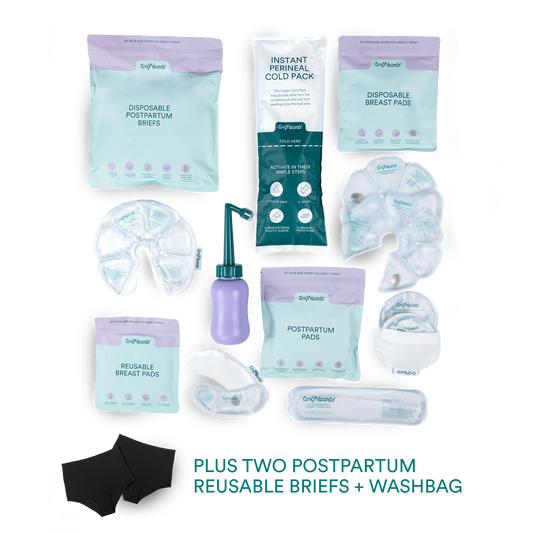
Ever experienced lengthy periods where your little one just cries and cries? You’re not alone, and there’s actually a term for that! Colic babies can be described as babies who cry a lot or fail to settle for a lengthy period.
Colic crying and fussing can begin at any time, but it generally occurs in the late afternoon and evening and is most common in babies between the age of two weeks and four months old. And for parents, this can be exhausting!
While it is common for young infants to cry, colic is a step up from your usual cries for help. This happens all over the world, and you will usually be able to identify whether or not your baby is colic if every common soothing technique under the sun doesn’t work.
Sounds demanding right? Don’t stress, your pals over at Tiny Hearts are here with everything you need to know about Colic Babies.
CAUSES
So what’s causing your bub’s crying? There are various reasons as to why your little one is failing to settle; this can include medical issues, new experiences or differences in their usual routine.
Medical
Occasionally, there may be a medical reason behind your child’s continuous crying. If you believe there may be a medical undertone to your child’s colic behaviour, please see your local GP. It is important to remember that crying is a regular part of growth and development, so medical factors are generally rare.
We recommend visiting a doctor if:
- You need reassurance that there is no medical cause for the crying.
- Your baby is refusing feeds or is having less than half their regular feeds.
- Your baby does not seem to settle with any of the things you are trying.
- Your baby continues to cry for extended periods.
New Experiences and Differences
Believe it or not, sometimes being a tiny little human can be hard! Each day they're exposed to a whole range of new experiences which they have to adapt to. Some physical or emotional experiences can be sensitive to babies which may result in them being unsettled.
For example, discomfort may occur when they feel gas in their tummy for the first time or if they spend a night away from their parents and feel alone.
New experiences can take some infant’s longer than usual to adapt to, and this may be the result of their crying and fussiness.

AT HOME CARE
If there are no underlying medical factors to your little one’s crying, the best way to help soothe your infant is to try some at home care tips.
“Tiny Hearts, seriously? I swear I’ve tried everything.”
Okay, we get you, and that’s why we’ve come up with the ultimate list of ways to help settle your bub!
Feeding Techniques
Let your baby suck at the breast or bottle as their crying may be from excessive hunger. If you’re unsure about feeding amounts, please talk to your local GP or nurse.
Your Attitude
- Try and remain calm! Your baby can pick up on your emotions, and if you’re visibly distressed, it can be challenging to reassure your bub.
- Put yourself in your bub’s shoes - what could be upsetting them? Our babies communicate to us by crying, so they are unsettled for a reason. Make a mental checklist of what could be checked, e.g. do they need to be fed? Do they need a nappy change? Did we go somewhere new today?
- Remember, you cannot spoil your baby with too much cuddling or feeding. The truth is some babies seem to need to be with their mother all the time, and if this is your bub - try not to fight this. As your little one develops more confidence they will learn to self-soothe.
- Speak softly to your baby. A calm voice and your presence may help to soothe them.
Bath Time Techniques
- Give your baby a warm and relaxing bath. If they are colic in the early evening, this can be the perfect way to ease them into sleep.
- After the bath, try giving your child a gentle massage with baby approved massage oil. This may help to relax your bub further.
Product Techniques
- It’s an obvious one but offer your child a dummy. Sucking may provide comfort and help your baby to settle
- Play soft music in your child’s nursery or around the house
- Introduce a doll or teddy that sits outside of the bassinet or cot. If your child suffers from separation anxiety, this may help them if they wake from sleep to not feel so alone
- Use a baby carrier or a sling if your baby wants to be around you all the time. It’s not unusual for bubs to suffer from separation anxiety. As they develop, they will grow more confident and learn to self-soothe

It’s also important to note that you should never shake a baby to stop them crying. Shaking babies, even in the slightest manner, can cause brain damage and life-long disability.
MEDICATION
The Royal Children’s Hospital does not recommend giving your baby medication to help settle them. Medication should only be used on the advice of a doctor as it may mask illness, interfere with feeding or make your bub drowsy and excessively sleepy.
EFFECT ON PARENTS
Having a colic baby can be mentally exhausting and challenging for parents. It’s common for parents to worry that their child’s crying is a result of something they have done which can be a hard knock for any parent’s confidence.
If you are suffering from post-natal depression, experiencing family stress, loss or just having a difficult time, this can reduce some your ability to interact confidently with your baby making it tricky to feel responsive to your little one. It’s important to remember; you are not alone.
If at all possible, seek support from family and friends or reach out to external help groups such as mothers groups, Maternal and Child Health Nurses, infant mental health specialists, a counsellor or your family doctor.
Some parents find it useful to take a short break from their bub, by reaching out to these services so they can get expert advice and relax.
If you are finding it hard to enjoy your bub because of their crying or you feel your mental health is being affected, please seek help. Some services have expertise in these areas, and we guarantee they’ve got some fantastic help waiting for you.

It’s important to remember that being unsettled and crying is very common in all babies up to four months of age. All infants are different and develop at their one pace which is why some cry for more extended periods than others.
If you are ever unsure or need advice on your child’s colic behaviour, talk to your local GP or Maternal and Child Health Nurse about what action to take or for help. They are the experts at the end of the day!
Remember, you’re not alone, and you’ve got this!
Sources








